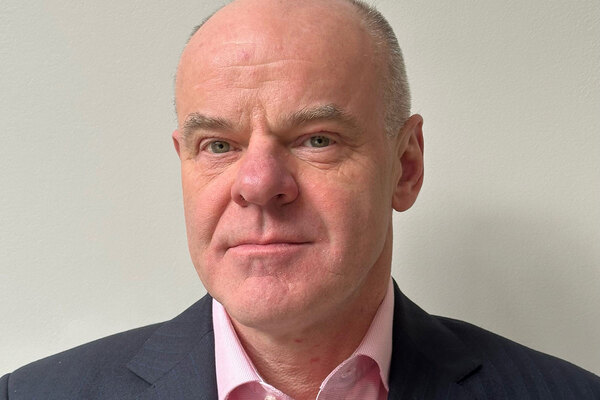You are viewing 1 of your 1 free articles
Danny Dorling, champion of the poor
Britain’s foremost thinker on inequality has turned his attention to the housing crisis. Professor Danny Dorling takes Dawn Foster on a tour of his home city
‘I always had an interest in social divisions because I grew up in this city,’ Professor Danny Dorling explains, gesturing at the Oxford landscape and seemingly contradictory housing stock.
Behind us is a row of immaculate, new yellow-brick flats with balconies and polished 4x4s parked outside. In front is a compact council estate and, visible over those roofs, Professor Dorling points out an idealised Oxford sight: ‘Look! A dreaming spire.’

Source: Alastair Johnstone
Arguably the foremost thinker on poverty and life chances, the professor of geography at Oxford University is to follow up his influential book on housing, All That is Solid, published earlier this year, with Inequality and the 1% - which asks: can we afford the super-rich? - on 26 September.
Having caught the imagination of the housing community with All That is Solid’s 10-point plan to fix the housing crisis, Professor Dorling’s ideas could play a prominent role as the issue gains political importance in the run-up to next year’s election.
Now a year into his role at Oxford, the professor took Inside Housing on a tour of the city, which he sees as a microcosm of the British housing landscape, and hears his ideas on solving the crisis, political elites and the problem of Britain’s attitude to housing.
Blue-blooded
Relaxed, in a collarless shirt with his hands in his pockets, he talks amiably about his work and the local area. For someone with a focus on such unhappy subjects as poverty, homelessness and ill health, he is remarkably sunny.
He offers me a cup of coffee before we set off, and checks we are parked somewhere we will not be clamped by over-zealous traffic wardens.
Born in Oxford a few miles from where we stand, before leaving to study at Newcastle University, Professor Dorling has come full circle: his mother was a maths teacher and his father a GP in east Oxford.
Last year he accepted a post at Oxford, and has moved down from Sheffield, where he was professor of human geography.
His research, too, has come full circle: his first academic job, he explains, was as a research assistant in the housing group at Bristol University in the early 1990s. His focus there was initially on homelessness, and then negative equity for mortgage holders, once it became a worry for the government and the Bank of England.
He has since written at length about relative poverty, inequality, life chances and education, before returning to the problem of housing in All That is Solid.
He has won plaudits for making the hard graft of statistical evidence accessible and interesting, and for bridging the gap between the academic and the popular.
David Blunkett, Labour MP for Sheffield Brightside and former home secretary, tells Inside Housing: ‘Danny’s work has been outstanding in bringing academic rigour to bear on real-world policy and the implications for decision makers. He’s one of those academics who give research a good name.’
Social geography - Professor Dorling’s speciality - is the study of social trends and inequality and how they map across the nation. It might sound dry, but is deemed important enough for Nick Clegg, deputy prime minister, and MP for his former employer, Sheffield University, to seek his thoughts. Professor Dorling seems less enamoured, though.
In All that is Solid, he wrote: ‘Like a child accompanying the school bully when he takes pocket money off a weaker child, and who later claims he did not know what was going on, the Liberal Democrats appear to be very gullible coalition partners.’
This is after Guardian columnist Simon Jenkins described Professor Dorling in 2007 in an article for the Guardian as ‘the geographer royal by appointment to the left’.
Professor Dorling got his own back by referring to Mr Jenkins as ‘commentator and multiple-property owner Simon Jenkins’.
House move
So what prompted this social geographer to write a book on housing?
‘I was asked, is the most honest answer,’ he admits. ‘And it wasn’t a completely charlatan move - I’d done all this research 20 years before.
‘The one sort of fortunate thing about the book is I ended up moving house while writing it, which made the book better I think because it became a bit personal.

Source: Alastair Johnstone
‘It was supposed to be a book written entirely in Sheffield saying “[the media and politicians] are ignoring the rest of the country”. Moving to Oxford made me realise why people were complaining.
‘I was probably a little bit unsympathetic towards people moaning about living in London and the south east - until I had to do it.’
Housing is also a universal.
‘If you write or talk about inequality the vast majority of people just don’t get it,’ the professor says. ‘Because it’s abstract, it often involves things that don’t affect them, whereas housing every day affects everybody. Everybody’s got to pay a mortgage or rent, everybody has to move at some point, and our housing’s incredibly expensive.’
All this ties in with his latest book.
‘It’s largely expensive because we’re a very unequal society,’ he adds. ‘If our richest 1% have 15 times the average income, that takes a lot of exploiting of people to keep up with the Joneses.
‘You’ve got a private rental sector, who are taking over council housing and are just letting the whole stock get worse and worse, because it’s about short-term gain.
‘But underlying all of this, you’ve got an ethos in this country stronger than other countries that your future’s up to you and it’s all individualistic, and if everyone just tries to maximise their own personal position we’ll all be OK.’
Last year, he also published two books, Population: 10 Billion on the evidence around population growth, and The 32 Stops, an experimental novella, telling the fictional tale of demographically average families living on each stop on London’s Central Line, exploring the life chances and economic fortunes and misfortunes of each area.
In the last five years, he has published 10 books, and when Inside Housing made the mistake of printing out his CV, we discovered it was 84 pages long. This prolific writing output seems to be the result of passion rather than a disregard for quality control: Professor Dorling can talk engagingly on anything from play schemes, to cycling, to immigration, peppering anecdotes and ideas with statistical quirks and findings.
But he has yet to convince the coalition government of the need to tackle inequality. The professor attributes this to the 1% - the small, detached group at the top of society.
‘Some of whom are very rich - like, say, [work and pensions secretary] Iain Duncan Smith or [welfare reform minister] Lord Freud, and just don’t get it,’ he says, wearily.
‘Then there’s another set who aren’t particularly rich. For example, the [right-wing pressure group] Taxpayers Alliance, who are just complete zealots and believe in a dog-eat-dog society. They’re like born-again Christians for free market capitalism.’
Wandering around Oxford in the sunshine, the social divisions are as stark as anywhere in London, but concentrated in a much smaller space. En route from the station to the suburbs of east Oxford, there are baroque university colleges, down-at-heel greasy spoon cafes, private schools with pristine tennis lawns, and all manner of housing, from Georgian mansions, to new-build shoebox flats, cottages and terraced social housing.
Children play outside in the nearby council estate as we talk, wealthy foreign students troop out of new-build flats to pricey Oxford University summer schools and a woman in a smart dress with glossy hair loads up a car outside a cottage with a large, landscaped garden.

Source: Alastair Johnstone
Home truths: Professor Dorling shows Dawn Foster Oxford ‘s range of housing types and tenures
But the gap between the wealthy and those in relative poverty is not as stark as in other parts in the UK.
Professor Dorling confides: ‘What’s funny is, you talk to people here and some of them say “Oh, the poor areas are absolutely terrible”. But they’re nothing compared to massive poor estates in the north of England.
‘But this place has the biggest council estate for 20 miles around, so people think this is what a poor council estate is like.’
The estate in question is typical of municipal housing in a small city: terraces leading into culs de sac of two-storey brick houses, with gardens front and back. Children are playing on scooters in the street. Professor Dorling spies a ‘for sale’ sign.
‘Aha! Here you go: ex-council house for sale and I bet you that’s £300,000. I’ll tell you why it’s £300,000 - it’s on the end, so you can bang on two bedrooms at the side and you can turn that into a four-bed. [There’s a] 75% chance that’ll be bought by a developer and rented.’
A little research back in the office confirms that the house is indeed on the market for exactly £300,000. A flat the same size in the new-build flats we earlier passed is on the market for nearly £400,000, only a five-minute walk away.
Net migration
If Professor Dorling were in charge of British housing tomorrow, he is clear about his priorities.
‘If I was in immediately, I would actually build, but I’d build because of immigration. You need a decent estimate of what you expect immigration to be and you need a plan, particularly for London and a few other bits of the south east.
‘But anything that gets people sorted out in housing could mean the equivalent of up to 40 years’ worth of building, so I’d try to get the old to downsize,’ he decides.
‘If I was Cameron, I wouldn’t have a clue because I’d have grown up in such a strange environment,’ he jokes. ‘But I would bump up council tax as part of the encouragement - add new bands to encourage the elderly to downsize.’
Some of Professor Dorling’s views on how to solve the crisis might raise an eyebrow among supporters of Shout, the campaign to protect social housing. Council housing, he says, ‘was a solution for problems in the past. So these were Homes for Heroes, they were great - the state mass provided them.
‘But I think we have a problem in general of picking things that worked in the past and thinking we want to do it again and not recognising that what the left did in the past is come up with something new - like council houses,’ he argues.
‘So defending council housing annoys me because I don’t think you want to build estates where everything looks the same.
‘When we first did it, there was no problem whatsoever, because everyone dressed the same, they all looked the same and their houses were the same.
‘But I would put housing back into the control of the local authority, ’ he concedes. ‘The only people who actually care about an area are elected councillors.
‘Nobody else with any power cares. But I’d give them a much wider remit to do things in a different way.’ And, of course, that logic applies to Oxford.
‘What the council hasn’t worked out yet,’ Professor Dorling notes, ‘is that Oxford could finally expand. This is the perfect place to build housing round the edge of - you can build housing without the need for cars, you can build on the east and west of the city, which is above a flood plain.
‘And you could, if you’re ambitious, add 100,000 houses on that side of Oxford. There are enough jobs here to sustain that growth.’
And he believes we are unlikely to see any dramatic improvement in the future.
‘The pessimistic argument is that we become more unequal, so we do a Boris Johnson, leave the European Union, bank in Ireland, run the tax havens of the world.
‘We provide the parliamentary back-up for all these little tax havens and we become like a Singapore for Europe - we have guest workers and so on,’ he muses. ‘The more optimistic scenario is also the more boring one, which says if you’re an outlier, the most likely thing is you’ll move towards the centre.’
And admittedly, when it comes to the future of housing, most people would prefer the boring, but familiar.

Danny Dorling’s 10-point plan to fix the housing crisis
- Extend the current council tax bands up to ‘Z’ with a view to transforming the tax into a fairer national land and property tax.
- Enhance the existing ‘right-to-stay’ into a ‘right-to-sell’, giving mortgagors the right to become tenants rather than face eviction.
- Second homes, holiday homes and empty commercial property need to be included in a fairer property tax system to discourage waste.
- Spare bedrooms should not be taxed. Every family should be able to live in a home with a spare room for visitors. We already have enough rooms. Every single adult who wants their own space should have it.
- An enhanced home-building programme will be needed if more people come to the UK than leave, as has been the case in recent years.
- Benefits are now so low that they must soon rise faster than wages, which must rise faster than salaries - all of which must rise faster than house prices. Rents need to stay still, if not fall. All these are out of balance.
- Greater income and wealth equality would be improved by the reintroduction of rent controls, which would also reduce housing benefit bills massively. The already calculated Local Housing Allowances could be used to set the maximum fair rent in an area.
- Squatting and all other acts that are done purely to seek shelter and not to steal items for profit should again be a civil, not a criminal, offence. Squatting is a symptom of a problem, not the problem itself.
- Illegal actions by the landlords and bankers that deprive people of their home and shelter should become criminal, rather than civil, offences.
- We have to recognise that housing is central to environmental sustainability. When we build we need to build for the very long-term
Source: All that is Solid, Danny Dorling







